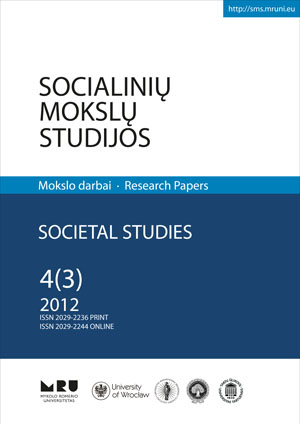Šeimos ir tautos tapatumas kaip socialinis kodas ir vertybė
The Identity of Family and Nation as a Social Code and Value
Author(s): Saulius KanišauskasSubject(s): Social Sciences
Published by: Mykolas Romeris University
Keywords: family; nation; identity; genetic; social and communicative codes; security
Summary/Abstract: The paper further analyzes the Act of the Constitutional Court of the Republic of Lithuania which significantly extended the notion of family. It is attempted to show that the Act implies the liberty of family members without any commitment to the society rather than prioritising marital relationship which ensures family stability. Thus, it might endanger the identity of the family and of the nation. The possibilities of transdiciplinary discourse framework, i.e. social synergetics, provide considerable support for the analysis of this idea. The identities of the family and of the nation are ensured by the unity of openness and covertness and a certain “characteristic organizer” which is called operational covertness, determined by mutually dependent genetic and social codes in synergetics. The social code is understood as a cultural environment which was unconsciously assimilated in infancy and childhood, i.e. social information which shapes the individual’s psychological characteristics, understanding of immediate environment and which influences behavioural patterns. The latest research indicates that social and genetic codes are heavily interdependent. The newly introduced notion of a communicative code (language, culture, customs, historical heritage) allows us to relate the family to the nation: both contain the same underlying idea of retaining identity. Taking into consideration Fromm’s insights, the paper argues that the basis of retaining the identities of the family and of the nation is almost the same as ensuring the security of individuals. Security is a power capable of organizing individuals into a family or nation; it determines all forms of family vitality and identity; a family break up is first and foremost associated with the loss of security. It is concluded that in the attempt to ensure the family’s and its members’ security and to retain its identity, it is vital to encourage responsibility within families and the citizen’s responsibility towards society. This must be legitimized by legal acts which ensure security and encourage responsibility. The main reason for this is that the underlying value for an individual, a family or the nation lies not in the unlimited freedom, but rather in the self-contained existence.
Journal: Socialinių mokslų studijos
- Issue Year: 4/2012
- Issue No: 3
- Page Range: 937-952
- Page Count: 16
- Language: Lithuanian

